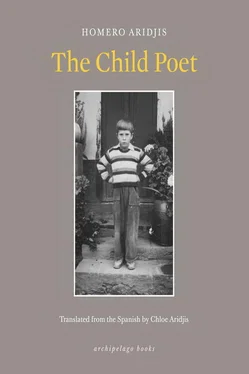In time, she turned violent and reacted to everything he did with fury, even before she knew what the matter was. She called him an idiot for selling an old horse for seven hundred pesos, although it wasn’t worth two hundred. She turned down plans for their sons’ education with disdain, calling them provincial. She took his forgetfulness as a deliberate ploy to annoy her. Nearly every night, Lucinda’s shouting escaped through the windows of the house, and blows were heard.
But what most irritated my uncle was her habit of sitting Julián on her lap and telling him, “Your father is a good-for-nothing,” “Your father is a cretin,” “We can’t depend on him.”
Their arguments, regardless of what triggered them, always ended with a battle between Contepec and Puebla; they attacked each other as a Contepecan and a Poblana, as if the places were responsible for their own defects, or as if it were a defect to have been born in one of them. In their mouths, these two places came to be not two towns in Mexico but two entire countries, whose citizens were so fiercely nationalistic that their differences always ended in a border war. And in each of these confrontations they threatened one another with separation and slaughter, a reminder that they were not twins, Siamese or otherwise.
My aunt often gave him a little kick or scratch. She threw stones, shoes, and spoons at him. With his face clawed, my uncle defined his marriage as a “bitter draft,” and avoided his wife by taking long walks on the mountain, by engaging in endless chats with the baker or in tedious perusal of The Swineherd’s Manual, Horse Illnesses , and The Inventions of Thomas Alva Edison .
Nevertheless, he tried not to tire out his body or his mind and to fill his days with intermissions. He never got fat or thin, his weight never varying. His expression was always the same, like a dirty shirt that’s been worn for a long time.
At night, the masculine odor of angel’s trumpet wafted through the open window into my aunt Inés’s bedroom. All eyes and silence, she let herself be penetrated by its perfume while she lay in bed reading “Abandoned women.” From a photograph on the wall, my grandmother looked towards the bed, her face still young and with my aunt seated on her lap. Between the childish face and my aunt’s present aspect, there had been a fearful gust of wind: time.
A mirror hung alongside Grandma’s photo, and near the mirror was a calendar from 1954, still open at the month of May, with the twenty-first circled in red. Both photograph and mirror had belonged to my grandmother. And the calendar commemorated her death.
The only current items in the room were a copy of Confidencias magazine, turned to the letters page, and the light of the moon, which entered white through the window.
To save Inés money on food, my mother sent her a bite to eat every day. Her only income was the rent from a cantina next door to her house.
Every day when our maid returned from there she brought with her the previous day’s plates and the invariable message that I should visit.
On the way to her house I liked to feel the afternoon sun on my face, its luminosity seeming to lift the village into the air. As I leaned against a parapet of the stone bridge, the only sound I heard was of things opening to the heat. People, houses, and hills appeared to ascend in a golden sphere. At this hour, one was most conscious of Contepec’s altitude.
When I reached my aunt’s house, if it was August, she offered me figs; if it was October, pears. She wanted me to cut them myself from the trees in her orchard so I could choose the ones that appealed to me.
Beside a crumbling adobe wall a climbing plant, its stake broken, grew by spilling over the ground, like a desperate hand that blindly searches for some means of support to cling to. But not finding anywhere to climb amid the worm-eaten beams and clumps of earth, it was nearly always dry.
Seated in the living room, my aunt would show me postcards with moving parts and the front cover of El Mundo , and tell my fortune with a deck of cards. Card in hand to predict my future, she foretold travels and weddings, betrothals and separations, paying little attention to chronological order or to contradictions in the events. She said I would have my first girlfriend after my wedding and told me I was going to spend my entire life in the village right after saying that I was destined to travel for twenty years. She also brought out photos of her female friends when they were girls around my age, remarking, “She’s very pretty and has a birthmark on her thigh,” “She’s passionate but still doesn’t know about men,” “She has big breasts and just came here from Uruapan.”
One day at dusk, as we drank hot chocolate in the garden, she told me that a general from Nogales wanted to come see her. The letters he’d been sending her over the past two years, with pages ripped out of the Cancionero Picot , arrived in blue and pink envelopes. Photos of himself at different ages were enclosed in many of them, as if he took pleasure in alternating his recent faces with others from when he was eight, fifteen, twenty-four, or forty years old; or perhaps by showing my aunt his previous faces he wanted her to know his whole life and meant to suggest there was nothing from his past he needed to hide.
While she spoke, she tore a roll in two from the bag of bread on her lap and dipped a piece in the hot chocolate. The jug was leaking onto the bare table, forming a dark puddle.
As I listened to her, the hole in the jug stoked my anxiety, as if my very being, ostensibly stationary, were escaping through a gap in the day, my life shrinking with every passing second.
One midday in January, a skinny little man got off the bus that came from the station with passengers from the Mexico City train. The blond toupee, shiny boots, and navy blue jacket made him look as if he’d just come out of a shop. The wrinkled seat of his trousers revealed that he’d been sitting for a long time.
After a few moments of indecision, doubtful about which way to walk, he came into the store and asked for Rayón Street.
He smiled at my father’s reply, as if the information obtained brought him closer to something he wanted, and set off in the direction of my aunt’s house.
He was going to propose matrimony to her.
He had with him two one-way tickets to Nogales.
There he would give her a wardrobe and put a house in her name.
His friend the judge had everything ready for the ceremony.
Another friend, the owner of a restaurant in Nogales, had all this for the banquet:
a dozen turkeys
50 kilos of rice
a sack of chiles
twelve pigs
six ducks
100 kilos of corn
twenty cartons of beer
fifteen bottles of tequila
seventeen crates of soft drinks
bananas, pears, apples, peanuts, tangerines.
His honorable mother, his honorable father, his worthy sisters, and his honorable son had made arrangements with the priest at the church.
But not only did my aunt not want to marry him, she didn’t even want to see him. The most she agreed to after their first encounter was a meeting in the store the following day at nine in the morning.
Consequently, the Generalito, as we already called him in the village, sat for many hours that night on a bench in the square holding an umbrella, though the sky was clear. He looked towards Rayón Street, and behind the shawl of every passing woman he saw my aunt’s face. Ricardo el Negro, my brother, and I went over to talk to him. Laughing heartily, my brother and Ricardo el Negro listened to him tell how he’d become a general during the Revolution. And, once he discovered that my brother and I were Inés’s nephews, he interrupted his stories to praise her: “There’s no woman like her!” “She’s definitely one of a kind.” And when he happened to mention a romance with someone else, he excused himself with, “I was very young,” or, “One’s only human.” Unforgettable women weren’t lacking in his conversation, women glimpsed once on some village street as he galloped past with his fellow troops.
Читать дальше












